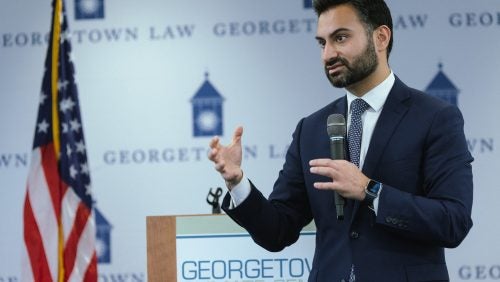From Georgetown Law to National Climate Policy: A Q&A with White House National Climate Advisor Ali Zaidi, L’15
May 9, 2023

White House National Climate Advisor Ali Zaidi, L'15, spoke at a Georgetown Climate Center event in February.
Earlier this semester, White House National Climate Advisor Ali Zaidi, L’15, visited his alma mater to give a presentation to the Georgetown Climate Center on highlights of the Biden administration’s climate policy agenda and achievements. More recently, we had a chance to ask him about his own time here on campus and about his advice to future lawyers interested in environmental law and public service.
How did it feel being back at Georgetown?
It’s always good to be around Georgetown Law students, who tend to be thinking about public policy issues in a creative and fresh way. It’s invigorating to be around young people who are propelling the movement for greater climate ambition.
You were working in the Obama White House, at the Office of Management and Budget, at the same time you were a student here. How did you make that work?
I was in “Section Seven” [Georgetown Law’s evening program]. I was an editor of the Georgetown Law Journal, played intramural basketball, made great friends along the way. Since my job [as OMB’s associate director for natural resources, energy and science] was probably twice as hard as a full-time job, that was all I was able to squeeze out of the experience. Although, by any measure, I got a lot out of being part of the program.
Georgetown Law was a place where for a few hours each day, I could escape into a classroom or the library and try to pick up skills to use when I showed up at work. Not three years later, but literally the next day, to see how I could be sharper in the tools I brought to the challenge.
Do any examples come to mind of things you learned at Georgetown Law that you’ve gone on to use in your career?
My property professor, Peter Byrne, was doing frontier work on the implications of a change of climate to property law. What do you do when the sea level rises and your property goes away? What do you own? Really probing at this broader quandary that we face, that all of these rules that we’ve written for ourselves are predicated on this notion of a stable climate.
Professor Anthony Cook was pushing students to think about how, regardless of what sector you end up in, you still have to ask yourself the same question: What am I doing to make the world a better place? And if the tools that you’re good at are the tools of public policy, then fine. And if the tools that you’re good at are the tools of project finance, then bring those to the greatest crisis that we face.
Some of what I learned has to do with public policy, but a lot of what I learned in law school, I actually applied to tackling climate change through private practice. I was focused on board counseling, fund formation and M&A, and I helped with billion-dollar-plus funds and acquisitions, all aimed at tackling the climate crisis.
So many current students are motivated to go into environmental law and climate policy. What advice do you have on how they can have a great impact in their careers?
Figure out what you’re good at. If you’re a tremendous oral advocate and you’re good at writing briefs, then maybe you need to be in an appellate practice. If you’re attracted to administrative policy, we have a lot of rules of the road that need to be written, and some that are grossly outdated, in the service of protecting public wellbeing in a changing climate. For the first time ever, we’ve got a very big need for tax lawyers to come help us write rules and regulations to administer $270 billion in the Inflation Reduction Act.
I think it’s very easy to say, I’m really interested in climate change, so I should learn environmental law. Well, maybe, if that’s the thing that you’re most excited about, but maybe not. When I was teaching at Stanford, I created this Lawyers for a Sustainable Economy initiative. It started from this frustration that all legal pro bono in the environmental space tended to be around litigation, but there’s this whole economy of clean energy startups that wasn’t getting the benefit. So we pushed to bring pro bono legal services on the corporate side to tackle the climate crisis.
Last question, in a similar vein. A lot of people come to Georgetown Law because they are interested in the idea of public interest law in general. What would you say to them about what being a public servant has meant to you?
The opportunity to be a public servant is really one of the most profound blessings. To be able to align your heart and soul with the way that you spend your labor every day is just a treasure. And that’s what pulls me into this work.
I moved to the United States a month shy of six years old, brought by parents who saw a bright and brilliant American dream. For me, one of the surprising things growing up was to recognize that while that American dream had been accessible to me, it didn’t reach many people and many communities across this country that I love. So for all those of us who have benefited from it, it’s on us to make sure that dream reaches as broad and as wide as it can.